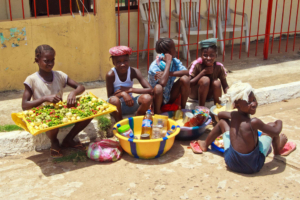3 Organizations Working Toward Poverty Reduction in Liberia


The Pro-Poor Agenda for Prosperity and Development in Liberia is daring and has broad goals. The International Monetary Fund (IMF) outlined that Liberia seeks to eliminate poverty and hunger, bridge gender inequalities, provide comprehensive education and increase its people’s overall quality of health.
In Liberia, the number of households below the extreme poverty line increased to more than 50% as of 2021. Half of Liberia’s families live on less than $2 a day. Countries have tried many ways to tackle the problem of poverty. Some have worked, some have not and some are still being studied. The following are organizations working toward poverty reduction in Liberia.
3 Organizations Working Toward Poverty Reduction in Liberia
- GiveDirectly. GiveDirectly is a nonprofit organization that believes in universal basic income. It stands behind the idea that poverty reduction in Liberia is possible. A UBI is financial assistance awarded to people living in extreme poverty. As of December 2023, GiveDirectly reported that its UBI initiative in Liberia has dramatically improved the quality of life of Liberians, and it provides data for improving the structure of UBIs for future positive impact. GiveDirectly offers the UBI to all of Liberia’s people experiencing extreme poverty, regardless of outside factors like unemployment or disabilities. It engages in long-term studies to examine the impact of its efforts toward poverty reduction in Liberia. After three years of study, the company gathered positive and applicable results, including happiness, overall well-being and food security. The group is meticulous about its research and the information it gathers, even offering equations on its website showing its study’s positive and negative results.
- New Breed Tech Hub. New Breed Tech Hub offers a real-life Magic School Bus in their struggle against poverty reduction in Liberia. This startup engineered a mobile ground assault on digital illiteracy in Northern Liberia by building a computer lab into a bus. It offers education programs to women and children to help develop their skills for the 21st-century job market. Access to the internet and technological proficiency are increasingly regimented in this market. Founder Jeremiah Lloyd Cooper, a survivor of post-war Liberia, says he wants to give kids opportunities “he did not have” and “prepare them for the 21st Century workforce.” Technology bridges extreme poverty to the possibility of a brighter future. Online education programs for struggling adults help them learn new, marketable skills. There is detailed environmental information gathered from drones to help farmers maximize their crop output. In addition, there are digital currency routes for impoverished people to receive donations and payments for services rendered as just a few of the ways that technology boosts an economy. Technology is one of the critical factors affecting poverty reduction in Liberia. However, if the people of Liberia are not adept at using technology, all possibilities become moot points. That is why New Breed Tech Hub’s venture is such an important and novel idea. The company can build a more positive future with the skills learned from its mobile computer labs.
- DE4A. Around 33% of Liberians are using the internet compared to 63% of people on the planet. Moreover, it costs an average of $2 for 1G of data. The average household under the extreme poverty line can expect to have only $2 for necessities like food, clean water and shelter. The Digital Economy for Africa (DE4A) is an initiative from the World Bank that proposes to bring affordable internet to households and businesses by the year 2030 at the latest and has already had a significant impact on the cost of data and the distribution of the internet. The initiative managed to increase the number of people who had access to the internet from 26% in 2019 to 36% in 2022. It also decreased the cost of data, lowering the price from 10% of a household’s income to 5%.
What’s Next?
Several initiatives and organizations are actively working to alleviate global poverty and support poverty reduction efforts in Liberia. While the examples mentioned above are just a few, there is hope for new opportunities that aim to create a safer and more equitable Liberia.
– Antonio Muhs
Photo: Wikimedia Commons
